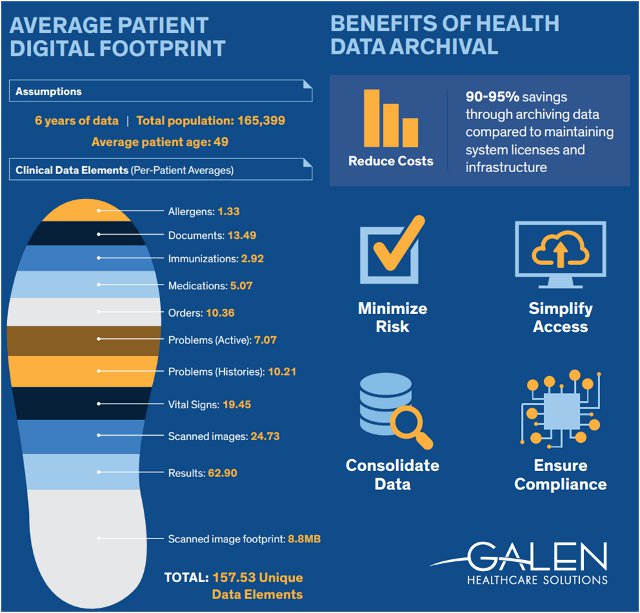In their latest infographic (Check out the full infographic), Galen Healthcare Solutions provides critical information and statistics surrounding EMR data archival including:
- Healthcare Data Growth
- Healthcare Data Archival Drivers
- Mergers & Acquisitions
- Legacy System Retention Requirements
- Healthcare Data Archival Benefits
- Average Patient Digital Footprint
- Industry Leading Archival Solution
Healthcare Information Technology leaders face challenges in keeping pace with new initiatives and consequently, managing a growing collection of legacy systems. With drivers including mergers & acquisitions, vendor consolidation, application dissatisfaction and product sunsets, it’s estimated that 50% of health systems are projected to be on second-generation technology by 2020, according to the IDC. As these new systems are implemented, multiple legacy systems are left behind, requiring healthcare IT staff to provide support and maintain access.
The strategy of keeping a patchwork of legacy systems running in order to maintain access to data is risky, resource intensive and can be quite costly given licensing, support, and maintenance needs. Decommissioning legacy systems with a proven archival system reduces cost and labor, minimizes risk, ensures compliance, simplifies access and consolidates data.
- Reduce Costs: Streamlining the long-term storage of historical PHI now will save money in the long-run. Not only will it reduce costs paid for the support and technical maintenance of the legacy system, but it will also save on training new staff on the new system over the next 7-25 years. In addition, incorporating data archival efforts with a discrete data migration provides significant economies of scale.
- Minimize Risk: Preserving historical patient data is the responsibility of every provider. As servers and operating systems age, they become more prone to data corruption or loss. The archiving of patient data to a simplified and more stable storage solution ensures long-term access to the right information when it’s needed for an audit or legal inquiry. Incorporating a data archive avoids the costly and cumbersome task of a full data conversion.
- Ensure Compliance: Providers are required to retain data for nearly a decade or more past the date of service. In addition, the costs of producing record for e-Discovery range from $5K to $30K/ GB (Source: Minnesota Journal of Law, Science & Technology). Check with your legal counsel, HIM Director, medical society or AHIMA on medical record retention requirements that affect the facility type or practice specialty in your state.
- Simplify Access: We all want data at the touch of a button. Gone are the days of storing historical patient printouts in a binder or inactive medical charts in a basement or storage unit. By scanning and archiving medical documents, data, and images, the information becomes immediately accessible to those who need it.
- Consolidate Data: Decades worth of data from disparate legacy software applications is archived for immediate access via any browser-based workstation or device. Also, medical document scanning and archiving provides access to patient paper charts.
Because the decision to decommission can impact many people and departments, organizations require a well-documented plan and associated technology to ensure data integrity.
Download the full archival whitepaper to understand the drivers that impact archival scope specific to both the industry and your organization.
About Justin Campbell
Justin is Vice President, Strategy, at Galen Healthcare Solutions. He is responsible for market intelligence, segmentation, business and market development and competitive strategy. Justin has been consulting in Health IT for over 10 years, guiding clients in the implementation, integration and optimization of clinical systems. He has been on the front lines of system replacement and data migration and is passionate about advancing interoperability in healthcare and harnessing analytical insights to realize improvements in patient care. Justin can be found on Twitter at @TJustinCampbell
About Galen Healthcare Solutions
Galen Healthcare Solutions is an award-winning, #1 in KLAS healthcare IT technical & professional services and solutions company providing high-skilled, cross-platform expertise and proud sponsor of the Tackling EHR & EMR Transition Series. For over a decade, Galen has partnered with more than 300 specialty practices, hospitals, health information exchanges, health systems and integrated delivery networks to provide high-quality, expert level IT consulting services including strategy, optimization, data migration, project management, and interoperability. Galen also delivers a suite of fully integrated products that enhance, automate, and simplify the access and use of clinical patient data within those systems to improve cost-efficiency and quality outcomes. For more information, visit www.galenhealthcare.com. Connect with us on Twitter, Facebook and LinkedIn.














